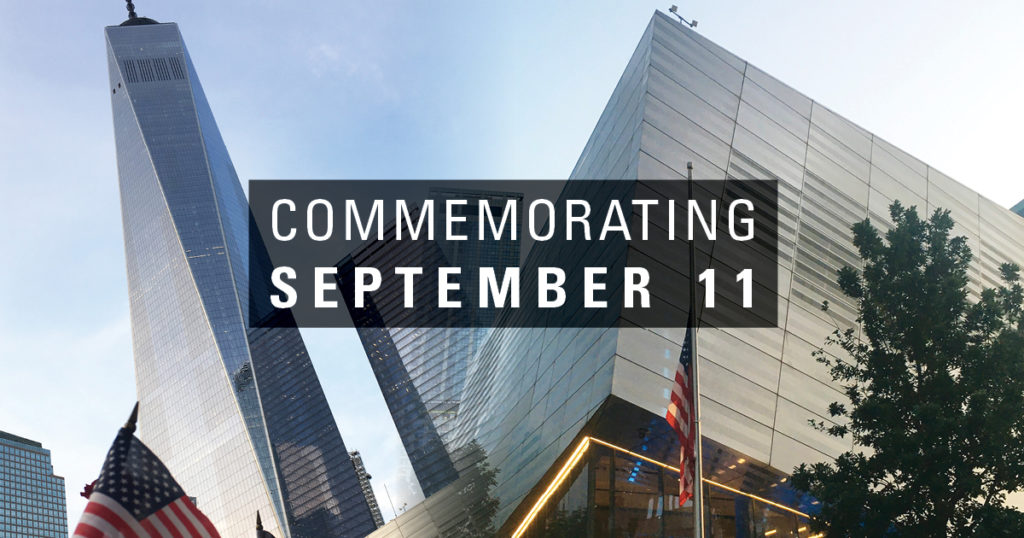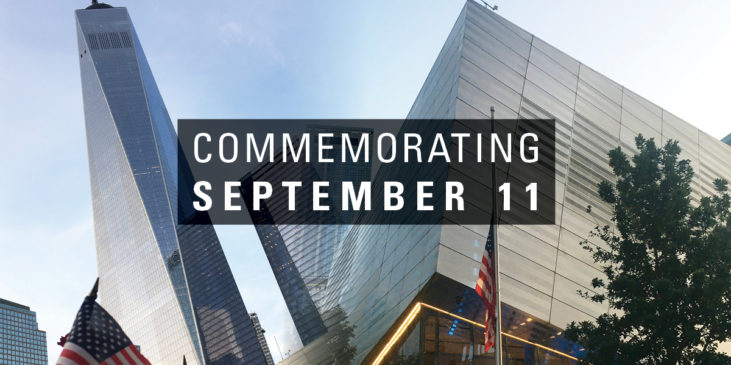
Twenty years ago, on a bright and clear September morning, the unimaginable happened just a few blocks away from New York Law School (NYLS). Today, we commemorate the tragedy that shook the world and reshaped New York City and the nation. The grief, courage, and resilience shown by New Yorkers that day and in the subsequent weeks fueled a national determination to recover and rebuild in the face of the most difficult challenges.
As recounted in the foreword of Eight Blocks Away, a collective memoir authored by the NYLS community: The campus “lost [its] ties to the world: electrical power ceased, phone lines went down, computers were out, Internet connection was severed. For two weeks, regular activities were suspended . . . [N]o one was unscathed, for all were witnesses to a horrific moment that would change the country, in ways still difficult to tell, forever.”
Four NYLS alumni were killed in the September 11 attacks: Craig Lilore ’98, Weirong Lin ’98, Joseph Lostrangio ’78, and Richard Madden ’92—all of whom were working in offices in the World Trade Center. And many in the community suffered the loss of family, friends, colleagues, and neighbors among the nearly 3,000 lives lost that day. The NYLS community continues to mourn these losses and honor their memories today.
Amidst the tragedy, however, stood the brave and selfless acts of the first responders who rushed into the danger to save lives. Among them were NYLS alumni. Kevin Cunnane ’04, a fire marshal, arrived on the scene right as the second tower came down. James Brown ’04 and James Kennelly ’02 were firefighters in the New York Fire Department and soon joined thousands of rescue workers who came to help. NYLS Professor Kirk Burkhalter ’04, an NYPD Detective and Evening Division student at the time, worked nonstop, first responding to the scene and working on recovery, followed by counter-terrorism investigations to protect the City from further attacks. Professor Burkhalter recounted his experiences in a recent interview.
Everyone in the city also stepped up to help however they could. As nearby buildings were evacuating after the first plane hit, Gerald Simpkins ’02, a 4L student in the Evening Division at the time, worked with other colleagues to carry a wheelchair-bound colleague to safety down 69 floors through smoke and intense heat. After the devastation, NYLS community members recall rushing to the Red Cross to volunteer or standing in line to donate blood.
The tragedy gave community members a reinforced sense of purpose and drive for action as they came together to rebuild and recommit to the rule of law. In Eight Blocks Away, Maxine N. Cenac ’03 reflected on her experiences of the day: “[L]et us remember that before this attack, there were numerous other threats to democracy—poverty, racism, sexism, and inequality in education. They still exist. There is much to be done. Today, I am a lawyer-in-the-making, with a renewed passion to carry on the work of Charles Houston, Thurgood Marshall, Marian Wright Edelman, and others…There is no going back. Before I breathe my last breath, may I go, knowing that I valued the life given to me, gave as much as I took, and ran toward, instead of away from any challenge worth fighting for.”
In the weeks and months after the attacks, the NYLS community rallied together with their Tribeca neighbors in a collective show of courage and support to bring our community back as strong as ever. That grit and resilient spirit live on today as our City, including our Tribeca neighborhood, experience the ongoing effects of the COVID-19 pandemic, with NYLS joining with other community members to form the Tribeca Pandemic Recovery Task Force.
As we remember the significance of this day, we can reflect on the best aspects of our nation, and how the legal profession can help take action and uphold our democratic values, moving forward together toward a brighter future.
Reflecting on the September 11 Memorial
In honor of the 20th Anniversary, the Center for New York City Law invited Michael Arad, Lead Designer of the National September 11 Memorial, to speak at the CityLaw Breakfast Series about the design and construction of the Memorial, and reflecting absence and loss in New York City. The conversation highlighted the importance of civic public spaces in who we are and how we handle tragedies, and how that influenced the design of the memorial. You can watch the full discussion on CityLand.

